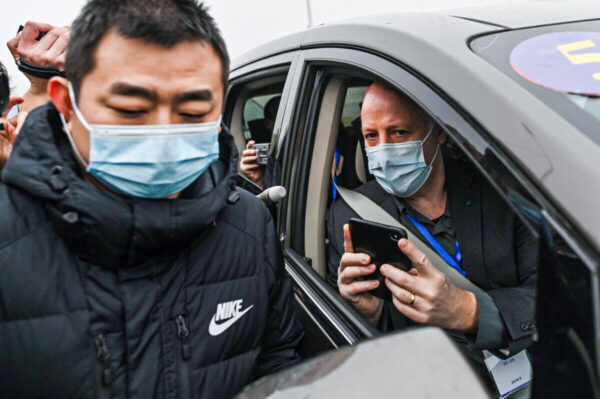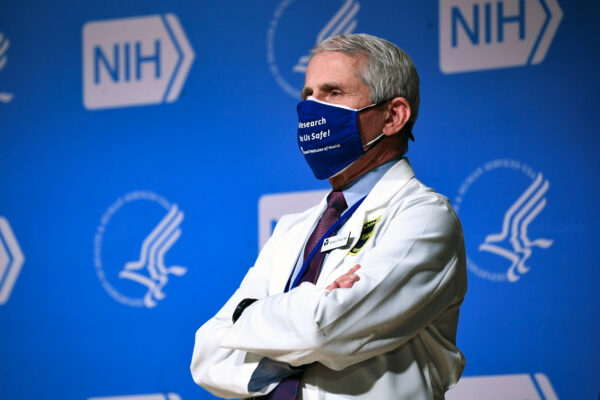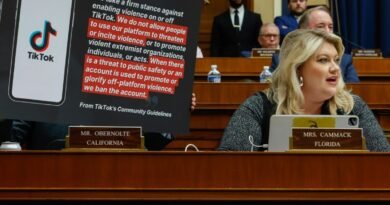Experts Condemn NIH Grant Renewal for Coronavirus Bat Study to Wuhan Lab-Linked EcoHealth
Experts have condemned the U.S. National Institutes of Health’s (NIH’s) decision to re-activate a controversial federal grant to EcoHealth Alliance that was suspended three years ago over concerns of grant term violations.
EcoHealth Alliance, the nonprofit organization that for years prior to the COVID-19 pandemic used NIH funds to conduct coronavirus research at the Wuhan Institute of Virology in China, the Chinese facility under scrutiny for its work on dangerous bat coronaviruses, announced the new 4-year grant to be used to study “the risk of bat coronavirus spillover emergence” in a May 8 press release.
Under the terms of the grant (pdf), EcoHealth, headed by British zoologist Peter Daszak, will receive a total of $$4,325,005 over a four-year period via NIH’s National Institute for Allergies and Infectious Diseases (NIAID), which was headed by Dr. Anthony Fauci until last December. The award amount for 2023 is $576,290.
Rep. Brett Guthrie (R-Ky.), who chairs the House Energy and Commerce subcommittee on health, said the news was “shocking and disappointing.
“EcoHealth Alliance not only has documented negligence, ignorance, and failures in following the rules of a taxpayer-funded grant, but also is the subject of a congressional investigation on its research with the Wuhan Institute of Virology,” he told The Epoch Times. “We’re going to get answers on behalf of the American people why their money is being awarded to EcoHealth Alliance.”
EcoHealth is currently the recipient of 17 active U.S. government grants totaling more than $50 million.
“Zoonotic coronaviruses (CoVs) represent a significant threat to global health, as demonstrated by the emergence of SARS-CoV, MERS-CoV, and SARS-CoV-2,” the press release reads.
The nonprofit went on to state that its prior work has demonstrated that “bats in this region harbor an extraordinary diversity of SARSr-CoVs, some of which can use human ACE2 for cell entry, and can infect humanized mouse models to cause SARS-like illness and evade available therapies or vaccines.”
“Yet salient questions remain on the origin, diversity, capacity to cause illness, and risk of spillover of these viruses to people,” they added, noting that the renewed grant—amounting to roughly $2.3 million in taxpayer funding—will help address these questions.
The nonprofit is expressly forbidden from conducting any research in China. It is also banned from collecting any new samples of bats or humans and must implement additional oversight measures.

‘Unforced Error’
Several U.S. agencies and independent scientists have concluded that a Wuhan lab leak most likely caused the COVID-19 pandemic. A new Senate report in April arrived at the same conclusion, saying the “preponderance of information supports the plausibility of an unintentional research-related incident that likely resulted from failures of biosafety containment during SARS-CoV-2 vaccine-related research.”
Despite concerns over the reinstated grant, EcoHealth Alliance president Daszak, who has dismissed the lab leak theory, praised the move in a lengthy Twitter thread. He said the funding will help the non-profit conduct work that will “benefit public health,” and suggested the previous grant termination “seemed to have been hastily prepared and ignored appropriate norms.”
Richard Ebright, a molecular biologist and Board of Governors professor of chemistry and chemical biology at Rutgers University, New Jersey, disagreed.
“Termination of the grant was an appropriate response to EcoHealth Alliance’s possible role in the origin of COVID-19 and to EcoHealth Alliance’s definite violations of grant terms and conditions,” he told The Epoch Times. And the grant reinstatement, he added, is a “show of contempt” from NIH officials toward Congress and the public.
“It is an unforced error that will damage Congressional and public support for the NIH,” Ebright said.
The NIH has agreed to bolster oversight to mitigate risks in its future research into potential pandemic-causing pathogens and use appropriate rate biosafety precautions. EcoHealth also made modifications to the program, such as using computer modeling and amino acid sequence analysis to conduct analyses of the viruses. It noted that it would not use “recombinant virus technology,” which involves modifying viral genomes.
But the changes haven’t strengthened Ebright’s confidence in the organization.
“They promise their future research will be less reckless than their previous research, promising they will stop constructing enhanced potential pandemic pathogens and will start using appropriate rate biosafety precautions,” he said of EcoHealth. “But these promises do not erase their previous recklessness, obstruction, and violations.”
Elsewhere, Sen. Joni Ernst (R-Iowa) also expressed alarm at seeing the suspension lifted on the EcoHealth grant.
“From funneling taxpayer dollars into China’s Wuhan Institute of Virology for risky experiments on bat coronaviruses to enhancing dangerous pathogens, EcoHealth has hidden what was really happening with this project, violating federal laws in the process.”
“NIH even acknowledges we may never get answers,” Ernst continued. “Giving EcoHealth another penny of taxpayer money, particularly for this notorious project which could have caused the COVID-19 pandemic, is absolutely batty.”

‘Calamitous Collaboration’
NIAID awarded a number of grants to EcoHealth Alliance between 2014 and 2019 amounting to over $3 million to study bat coronaviruses in China in collaboration with the Wuhan lab, which the agency put on pause over grant compliance concerns in April 2020 following the COVID-19 pandemic.
While NIH has denied that bat coronavirus studies conducted by EcoHealth Alliance under its grant led to the COVID-19 pandemic, it stated in an October 2021 letter to Republican lawmakers that the experiments it funded had the “unexpected result” of creating a coronavirus that, when injected into mice, made them sicker than those injected with another naturally occurring bat SARS-like coronavirus called WIV1.
The White Coat Waste Project (WCW), which has been highlighting EcoHealth’s “calamitous collaboration” with the Wuhan lab since April 2020, condemned the grant renewal, pointing to the Wuhan lab’s risky experiments in the past.
“The batty taxpayer-funded grant that bankrolled EcoHealth Alliance’s dangerous animal experiments in Wuhan that probably prompted the pandemic should be de-funded, not re-funded,” Justin Goodman, the senior vice president of advocacy and public policy at the taxpayer watchdog group, told The Epoch Times.
Goodman noted a recent federal audit by the Office of Inspector General (OIG) of the Department of Health and Human Services (HHS) which found that the NIH had failed to effectively monitor EcoHealth Alliance’s research despite “identifying potential risks associated with research being performed under the EcoHealth awards.”
The report, he said, confirmed that “EcoHealth misspent tax dollars on this grant and grossly mismanaged its oversight of the Wuhan animal lab.”
“No one should believe anything that comes out of the mouth of this government-funded grifter who never prevented a pandemic and probably caused one,” he said, describing EcoHealth as a “reckless, rogue lab contractor that wastes money, breaks the law, abuses animals, and places public health in peril.”

The Energy Department concluded in February that the COVID-19 pandemic likely originated from a laboratory accident, The Wall Street Journal reported. The FBI arrived at a similar conclusion regarding a possible lab leak in 2021, noting the agency had “moderate confidence” in its assessment, FBI Director Christopher Wray revealed following the news of the Energy Department report.
He told Fox News that the agency is still investigating the origins of the virus but stated, “Here you’re talking about a potential leak from a Chinese government-controlled lab that killed millions of Americans.”
The NIH and Daszak didn’t respond to queries from The Epoch Times by press time.




